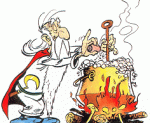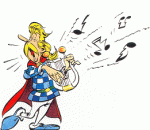innerdude
Legend
So on a whim I picked up the first Pendragon book, "Taliesin," on Kindle a while back, and thoroughly enjoyed it. But I was most interested how, if Lawhead's historical research is to be believed, that the concept of a "druid" and a "bard," at least in the 200-400 A.D. time period in Britain, were conceptually identical.
The notion that "druids" were wise, worldly naturalists and earth worshippers while "bards" on the other hand were a separate group of entertainers, poets, lyricists, and musicians was entirely false. They were the same people. The druids WERE the bards, and vice-versa.
And to be perfectly honest, this suddenly made the entire concept of BOTH CLASSES as presented in "traditional" D&D suddenly make sense to me. Don't get me wrong, I've always loved playing bards in D&D, but I've never been able to exactly pin down how their magic is supposed to work. How exactly is "bardic" magic supposed to work like a sorcerer, but be tied to their "performance" class attribute? Along those same lines, why was it a druid's "nature" magic somehow worked differently than "divine" magic even though mechanically it was identical?
To be more historically accurate, the current "druid" and "bard" concepts should basically be rolled up into a single "sage" class, where their focuses change based on character background, feats, and skill selection. If someone wants to keep the current druid concept of a "militant naturalist," it would be easy enough to fit it in as a ranger variant/background/sub-class.
It sounds crazy, but taking this approach suddenly makes a huge difference to the concepts behind them, with significant changes to "traditional" D&D world-building that just make a whole lot more sense.
The notion that "druids" were wise, worldly naturalists and earth worshippers while "bards" on the other hand were a separate group of entertainers, poets, lyricists, and musicians was entirely false. They were the same people. The druids WERE the bards, and vice-versa.
And to be perfectly honest, this suddenly made the entire concept of BOTH CLASSES as presented in "traditional" D&D suddenly make sense to me. Don't get me wrong, I've always loved playing bards in D&D, but I've never been able to exactly pin down how their magic is supposed to work. How exactly is "bardic" magic supposed to work like a sorcerer, but be tied to their "performance" class attribute? Along those same lines, why was it a druid's "nature" magic somehow worked differently than "divine" magic even though mechanically it was identical?
To be more historically accurate, the current "druid" and "bard" concepts should basically be rolled up into a single "sage" class, where their focuses change based on character background, feats, and skill selection. If someone wants to keep the current druid concept of a "militant naturalist," it would be easy enough to fit it in as a ranger variant/background/sub-class.
It sounds crazy, but taking this approach suddenly makes a huge difference to the concepts behind them, with significant changes to "traditional" D&D world-building that just make a whole lot more sense.


